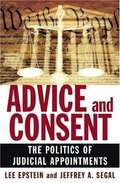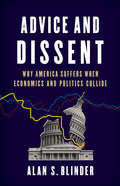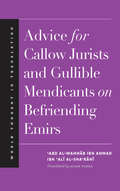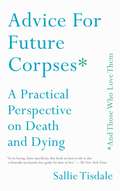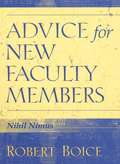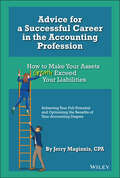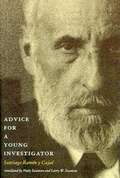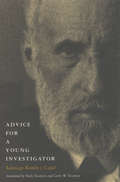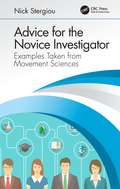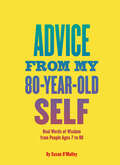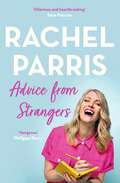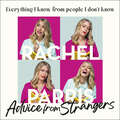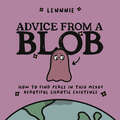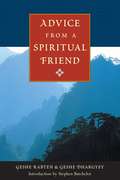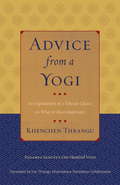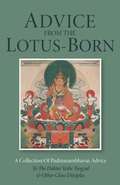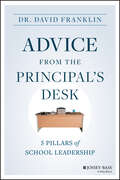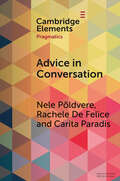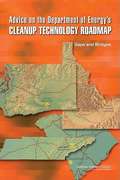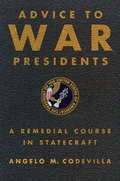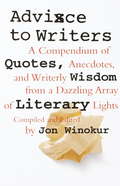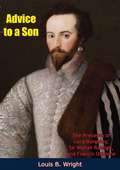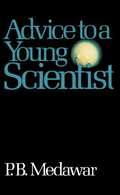- Table View
- List View
Advice and Consent: The Politics of Judicial Appointments
by Lee Epstein Jeffrey A. SegalFrom Louis Brandeis to Robert Bork to Clarence Thomas, the nomination of federal judges has generated intense political conflict. With the coming retirement of one or more Supreme Court Justices--and threats to filibuster lower court judges--the selection process is likely to be, once again, the center of red-hot partisan debate. In Advice and Consent, two leading legal scholars, Lee Epstein and Jeffrey A. Segal, offer a brief, illuminating Baedeker to this highly important procedure, discussing everything from constitutional background, to crucial differences in the nomination of judges and justices, to the role of the Judiciary Committee in vetting nominees. Epstein and Segal shed light on the role played by the media, by the American Bar Association, and by special interest groups (whose efforts helped defeat Judge Bork). Though it is often assumed that political clashes over nominees are a new phenomenon, the authors argue that the appointment of justices and judges has always been a highly contentious process--one largely driven by ideological and partisan concerns. The reader discovers how presidents and the senate have tried to remake the bench, ranging from FDR's controversial "court packing" scheme to the Senate's creation in 1978 of 35 new appellate and 117 district court judgeships, allowing the Democrats to shape the judiciary for years. The authors conclude with possible "reforms," from the so-called nuclear option, whereby a majority of the Senate could vote to prohibit filibusters, to the even more dramatic suggestion that Congress eliminate a judge's life tenure either by term limits or compulsory retirement. With key appointments looming on the horizon, Advice and Consent provides everything concerned citizens need to know to understand the partisan rows that surround the judicial nominating process.
Advice and Dissent: Why America Suffers When Economics and Politics Collide
by Alan S. BlinderA bestselling economist tells us what both politicians and economists must learn to fix America's failing economic policiesAmerican economic policy ranks as something between bad and disgraceful. As leading economist Alan S. Blinder argues, a crucial cultural divide separates economic and political civilizations. Economists and politicians often talk--and act--at cross purposes: politicians typically seek economists' "advice" only to support preconceived notions, not to learn what economists actually know or believe. Politicians naturally worry about keeping constituents happy and winning elections. Some are devoted to an ideology. Economists sometimes overlook the real human costs of what may seem to be the obviously best policy--to a calculating machine. In Advice and Dissent, Blinder shows how both sides can shrink the yawning gap between good politics and good economics and encourage the hardheaded but softhearted policies our country so desperately needs.
Advice for Callow Jurists and Gullible Mendicants on Befriending Emirs
by Adam Sabra Abd al-Wahhab al-SharaniThis mirror for princes sheds light on the relationship between spiritual and political authority in early modern Egypt This guide to political behavior and expediency offers advice to Sufi shaykhs, or spiritual guides, on how to interact and negotiate with powerful secular officials, judges, and treasurers, or emirs. Translated into English for the first time, it is a unique account of the relationship between spiritual and political authority in late medieval / early modern Islamic society.
Advice for Future Corpses (and Those Who Love Them): A Practical Perspective on Death and Dying
by Sallie TisdaleA straightforward, wise, and humorous narrative field guide for both the dying and those who love them by an author who brings a unique set of qualifications to this delicate subject—she's a Pushcart Prize-winning writer, a palliative care nurse with more than ten years of experience, and a lifelong Buddhist. <P><P>If you don't plan, you're only limiting your options. We do not know when we will die. We may see it coming from far away, or all at once. But I will die and you will die. You believe that, don't you? <P><P>You get ready to die the way you get ready for a trip. Start by realizing you don't know the way. Read a few travel guides. Study the language, look at maps, gather equipment. Let yourself imagine what it will be like. Pack your bags. This book is one of those travel guides—a guide to preparing for your own death and the deaths of people close to you. <P><P>The fact of death is hard to believe. Sallie Tisdale explores our fears and all the ways death and talking about death make us uncomfortable—but she also explores its intimacies and joys. <P><P>Tisdale looks at grief, what the last days and hours of life are like, and what happens to dead bodies. Advice for Future Corpses includes exercises designed to make you think differently about the inevitable. She includes practical advice, personal experience, a little Buddhist philosophy, and stories. <P>But this isn't a book of inspiration or spiritual advice—Advice for Future Corpses is about how you can get ready. Start by admitting that we are all future corpses.
Advice for New Faculty Members: Nihil Nimus
by Robert BoiceA guide to the start of a successful academic career.
Advice for a Successful Career in the Accounting Profession: How to Make Your Assets Greatly Exceed Your Liabilities
by Jerry MaginnisPractical guidance to optimize the benefits of your accounting degree—no matter what stage of your career! Originally conceived and designed to provide helpful advice to college and university accounting majors and early-career professionals, this book evolved into a valuable resource for those groups as well as others who may be further along in their accounting careers. It contains many practical examples and real-life experiences from a long and successful career in the profession that you won't find in any accounting, auditing, or tax textbook. And it is written in a fun and engaging style with a simple goal in mind: to share lessons learned and insights that will help accountants of all ages optimize their career opportunities! Jerry Maginnis, CPA, the former Office Managing Partner for the Philadelphia office of KPMG, one of the "Big Four" Accounting Firms, currently serves as the "Accounting Executive in Residence" at Rowan University in Southern New Jersey. In this role, he has counseled and mentored dozens of students and early career professionals. The book leverages Jerry's real-world experience and his advice and counsel is delivered in a fashion that will make you feel like you are having a one on one conversation with him! Readers will also enjoy: Advice delivered concisely: each chapter is succinct and provides essential takeaways and action plans for all points in a career A guidebook that is efficiently organized into three sections—for college and university students, for early-career professionals, for accountants of all ages and experience levels—allowing the reader to focus on the sections that are most applicable to them An excellent refresher or reminder of concepts or principles that are important to even the most successful and experienced accountants Loaded with "real world" tips and techniques, Advice for a Successful Career in the Accounting Profession is an ideal resource for accountants and auditors, tax and advisory professionals, and University professors and high school instructors teaching Accounting, undeclared business majors, underrepresented populations, and students aspiring to become CPAs.
Advice for a Young Investigator
by Neely Swanson Larry W. Swanson Santiago Ramón y CajalSantiago Ramón y Cajal was a mythic figure in science. Hailed as the father of modern anatomy and neurobiology, he was largely responsible for the modern conception of the brain. His groundbreaking works were New Ideas on the Structure of the Nervous System and Histology of the Nervous System in Man and Vertebrates. In addition to leaving a legacy of unparalleled scientific research, Cajal sought to educate the novice scientist about how science was done and how he thought it should be done. This recently rediscovered classic, first published in 1897, is an anecdotal guide for the perplexed new investigator as well as a refreshing resource for the old pro. Cajal was a pragmatist, aware of the pitfalls of being too idealistic -- and he had a sense of humor, particularly evident in his diagnoses of various stereotypes of eccentric scientists. The book covers everything from valuable personality traits for an investigator to social factors conducive to scientific work.
Advice for a Young Investigator
by Santiago Ramon Y CajalAn anecdotal guide for the perplexed new investigator as well as a refreshing resource for the old pro, covering everything from valuable personality traits for an investigator to social factors conducive to scientific work.Santiago Ramón y Cajal was a mythic figure in science. Hailed as the father of modern anatomy and neurobiology, he was largely responsible for the modern conception of the brain. His groundbreaking works were New Ideas on the Structure of the Nervous System and Histology of the Nervous System in Man and Vertebrates. In addition to leaving a legacy of unparalleled scientific research, Cajal sought to educate the novice scientist about how science was done and how he thought it should be done. This recently rediscovered classic, first published in 1897, is an anecdotal guide for the perplexed new investigator as well as a refreshing resource for the old pro.Cajal was a pragmatist, aware of the pitfalls of being too idealistic—and he had a sense of humor, particularly evident in his diagnoses of various stereotypes of eccentric scientists. The book covers everything from valuable personality traits for an investigator to social factors conducive to scientific work.
Advice for the Novice Investigator: Examples Taken from Movement Sciences
by Nick StergiouThis book is intended to help young and novice scientists by providing them with advice on how to overcome adversities. This advice comes in the form of numerous examples from the author’s career but also from the careers of many other scientists. It follows the thinking process of Ramon Y Cajal and his famous book, "Advice for a Young Investigator." It covers a variety of topics and areas that are fundamental in becoming a successful scientist. It presents chapters on all essential areas of the scientific life that appeal to a wide range of audiences, from the senior undergraduate student to the university administrator to the chief scientist in the industry. Some figures in the eBook are in color. Features Contains practical advice and many hints on a variety of topics; from how to write a grant to how to effectively manage your time Displays many examples of success and failure from other scientists that can teach valuable lessons Provides many personal stories and anecdotes in a form of sincere confessions Includes PowerPoint Presentation slides for each chapter for any academicians that want to develop such a class in their institutions
Advice from My 80-Year-Old Self: Real Words of Wisdom from People Ages 7 to 88
by Susan O'Malley“The voices gathered here display incredible wit, sincerity, and generosity; we are lucky to be able to listen to them.” —ArtforumIf you had the opportunity to meet your eighty-year-old self, what do you think she/he would tell you?That is the question artist Susan O’Malley, who was herself to die far too young, asked more than a hundred ordinary people of every age, from every walk of life. She then transformed their responses into vibrant text-based images. From a prompt to do things that matter to your heart, to a reminder that it’s okay to have sugar in your tea, these are calls to action and words to live by—heartfelt, sometimes humorous, and always fiercely compassionate. This stirring celebration of our collective humanity unveils the wisdom we hold inside ourselves right now.“Everyone, regardless of age, can take something away from this uplifting work.” —Real Simple
Advice from Strangers: Everything I know from people I don't know
by Rachel Parris'Warm witty and wise.' --RICHARD OSMAN'Hilarious, wise and heart breaking. Like an all-night over-share with your best friend.' --SARA PASCOE'Rachel is one of my favourite comedians. This book is warm, wise and hilarious. It is written in her comic voice - a voice she mainly has used to tell me off, so I am thrilled to see it deployed in this way.' --NISH KUMAR'The most joyful bursts of wisdom from a truly funny soul. I adore this book.' --CARIAD LLOYD'Hilarious, original and wise. This is essential reading.' --ELLIE TAYLOR'Rachel is one of the wisest, funniest people I know. Funny, sad, beautiful and ridiculous, Advice from Strangers has it all.' --PIPPA EVANS'A hilarious, fiery, reassuring hug of a book. Full of laughter, compassion and feminist wisdom.' --FRAN BUSHE'An essential, hilarious handbook for life.' --ATHENA KUGBLENUCOMEDIAN RACHEL PARRIS WAS ASKED TO GIVE AN INSPIRING GRADUATION SPEECH. WHO DID SHE ASK FOR ADVICE? TOTAL STRANGERS...Over the course of a year award-winning comedian Rachel Parris asked members of her live audience for advice. Here she takes those random bits of wisdom - such as 'Be Kind' or 'Never Pass Up the Opportunity for a Wee' - and explores them in ways that are funny and serious, hilarious and heart-breaking. This uplifting feminist manifesto of a book outlines the essentials of living in the modern world; dealing with everything from Tampons to Tories and from #hashtags to Staying Hydrated.
Advice from Strangers: Everything I know from people I don't know
by Rachel Parris'Warm witty and wise.' --RICHARD OSMAN'Hilarious, wise and heart breaking. Like an all-night over-share with your best friend.' --SARA PASCOE'Rachel is one of my favourite comedians. This book is warm, wise and hilarious. It is written in her comic voice - a voice she mainly has used to tell me off, so I am thrilled to see it deployed in this way.' --NISH KUMAR'The most joyful bursts of wisdom from a truly funny soul. I adore this book.' --CARIAD LLOYD'Hilarious, original and wise. This is essential reading.' --ELLIE TAYLOR'Rachel is one of the wisest, funniest people I know. Funny, sad, beautiful and ridiculous, Advice from Strangers has it all.' --PIPPA EVANS'A hilarious, fiery, reassuring hug of a book. Full of laughter, compassion and feminist wisdom.' --FRAN BUSHE'An essential, hilarious handbook for life.' --ATHENA KUGBLENUCOMEDIAN RACHEL PARRIS WAS ASKED TO GIVE AN INSPIRING GRADUATION SPEECH. WHO DID SHE ASK FOR ADVICE? TOTAL STRANGERS...Over the course of a year award-winning comedian Rachel Parris asked members of her live audience for advice. Here she takes those random bits of wisdom - such as 'Be Kind' or 'Never Pass Up the Opportunity for a Wee' - and explores them in ways that are funny and serious, hilarious and heart-breaking. This uplifting feminist manifesto of a book outlines the essentials of living in the modern world; dealing with everything from Tampons to Tories and from #hashtags to Staying Hydrated.
Advice from Strangers: Everything I know from people I don't know
by Rachel ParrisCOMEDIAN RACHEL PARRIS WAS ASKED TO GIVE AN INSPIRING GRADUATION SPEECH. WHO DID SHE ASK FOR ADVICE? TOTAL STRANGERS...Over the course of a year award-winning comedian Rachel Parris asked members of her live audience for advice. Here she takes those random bits of wisdom - such as 'Be Kind' or 'Never Pass Up the Opportunity for a Wee' - and explores them in ways that are funny and serious, hilarious and heart-breaking. This uplifting feminist manifesto of a book outlines the essentials of living in the modern world; dealing with everything from Tampons to Tories and from #hashtags to Staying Hydrated. (P) 2022 Hodder & Stoughton Limited
Advice from a Blob: How to Find Peace in this Messy, Beautiful, Chaotic Existence
by LennnieFrom social media sensation Lennnie, a full-color, illustrated self-care book filled with all-new insights to boost our mental health—wisdom to help us combat the negativity and hate, find acceptance and peace, and embrace the miracle of ourselves and the wonder of life itself. “Hello humans, my name’s Lennnie, I’m a little Blob that was sent by the book Gods to come check on you. So, let’s get into it shall we? It really is a chaotic tornado sh*tstorm of debauchery out there . . . but I promise you’re gonna be okay. Really Truly Absolutely Positively Fine. Even if it doesn’t feel like it right now.” At a time when many of us yearn for a world filled with more kindness, compassion, and community, Lennnie—an adorable, sassy, loving animated blob—has become a social media star. A dose of Lennnie’s gentle, down-to-earth positivity gets us get through even the darkest days, because Lennnie keeps it real, avoiding empty platitudes and reminding of us of the most important thing: love. Lennnie encourages us to disregard the haters, especially those negative voices that can fill our heads, and brings joy and happiness into our daily lives.Advice from a Blob features exclusive, all-new material covering a range of issues that matter most, both to Lennnie's avid fanbase and to everyone just discovering this beautiful little Blob. Packed with 130 unique, full-color illustrations with extended captions, this charming keepsake book offers wisdom and insights on important themes central to our mental health, including grief, loneliness, thought demons, failure, coping with change, anxiety, feeling lost, and finding your people. As Lennnie reminds us, no matter where we are in life, we’ve got this. copyright Lennnie, LLC
Advice from a Spiritual Friend
by Stephen Batchelor Geshe Rabten Geshe Dhargyey Sharpa Tulku Brian Beresford Gonsar Tulku"Do not wish for gratitude. Never strike at the heart. Now if you die, you will have no regrets." --The Seven-Point Thought TransformationLike wise old friends, two Tibetan masters offer down-to-earth advice for cultivating compassion, wisdom, and happiness in every situation. Based on practical Buddhist verses on "thought training" (lojong), Advice from a Spiritual Friend teaches how to develop the inner skills that lead to contentment by responding to everyday difficulties with patience and joy. Following Stephen Batchelor's introduction to the Kadamapa tradition that gave rise to these earthy, pithy instructions, Part One is a commentary by Geshe Dhargyey to Atisha's (982-1054) Jewel Rosary of a Bodhisattva. Part Two includes a commentary by Geshe Rabten to the famous Seven-Point Thought Transformation. First published in 1977, Advice from a Spiritual Friend is a Wisdom classic that has enriched readers in many editions over the years. As Batchelor says in his introduction, "These teachings are as applicable today as they were when Atisha first introduced them to Tibet."
Advice from a Spiritual Friend
by Geshe Rabten Geshe Dhargyey"Do not wish for gratitude. Never strike at the heart. Now if you die, you will have no regrets. " - The Seven-Point Thought Transformation Like wise old friends, two Tibetan masters offer down-to-earth advice for cultivating compassion, wisdom, and happiness in every situation. Based on practical Buddhist verses on "thought training" (lojong), Advice from a Spiritual Friend teaches how to develop the inner skills that lead to contentment by responding to everyday difficulties with patience and joy. Following Stephen Batchelor's introduction to the Kadamapa tradition that gave rise to these earthy, pithy instructions, Part One is a commentary by Geshe Dhargyey to Atisha's (982-1054) Jewel Rosary of a Bodhisattva. Part Two includes a commentary by Geshe Rabten to the famous Seven-Point Thought Transformation. First published in 1977, Advice from a Spiritual Friend is a Wisdom classic that has enriched readers in many editions over the years. As Batchelor says in his introduction, "These teachings are as applicable today as they were when Atisha first introduced them to Tibet. "
Advice from a Yogi: An Explanation of a Tibetan Classic on What Is Most Important
by Thrangu Dharmakara Translation Collab Khenchen Thrangu Padampa SangyeThe urgency of spiritual practice has seldom been as simply and powerfully conveyed as it is in Padampa Sangye's One Hundred Verses. This Tibetan Buddhist classic is an antidote to the tendency we all have to waste our precious human lives. Khenchen Thrangu's lively commentary on the text brings to light its subtleties and amplifies its applicability to our daily struggles, showing how an understanding of its teaching on impermanence is the key to working with common difficulties such as loneliness, craving, betrayal, competitive colleagues, or squabbling families. It speaks to us today as profoundly as it did to the people of Dingri, Tibet, to whom it was first addressed a millennium ago.
Advice from the Lotus-Born
by Erik Pema Kunsang Marcia Binder Schmidt Padmasambhava Tulku Urgyen Rinpoche" Don't mistake mere words to be the meaning of the teachings. Mingle the practice with your own being and attain liberation from samsara right now." PadmasambhavaPadmasambhava is the primary master of Vajrayana, the teachings for our time. Out of his great compassion and wisdom, he instructed his main disciple Yeshe Tsogyal to conceal terma treasures to be revealed at the destined time for future practitioners. The profundity of this advice is meant to be personally applied by all individuals in all circumstances. It is a classic work, which contains valid truth for anyone who sincerely wants to follow a spiritual path."The chief compiler of Padmasambhava's teachings was Yeshe Tsogyal, an emanation of a female Buddha. There may be some people who believe that only men can attain enlightenment, but her life is proof to the opposite. The awakened state of mind is neither male or female." Tulku Urgyen Rinpoche, from Introductory Teachings
Advice from the Principal's Desk: 5 Pillars of School Leadership
by David FranklinAn insightful and original take on educational leadership Advice from the Principal’s Desk: 5 Pillars of School Leadership is a fresh, new take on school leadership from award-winning former school administrator and professor of education Dr. David Franklin. In the book, you’ll find the tools and strategies that veteran school administrators need to succeed in their roles. You’ll learn how to increase attendance and parental involvement in student affairs, minimize suspension, navigate budget cuts, and more. The author explores five key areas that school leaders cannot neglect and examines how busy school leaders should spend their extremely limited time. You’ll also discover: Strategies you can deploy to best support your students and other stakeholders How to navigate the often-conflicting demands of parents, teacher unions, and governing bodies How to best use and implement technology to support your work and create a positive and productive school environmentAn ideal resource for current and aspiring K-12 principals and school administrators, Advice from the Principal’s Desk is packed with the research, real-world examples, and practical techniques that education professionals need to improve the results of their leadership.
Advice in Conversation: Corpus Pragmatics Meets Mixed Methods (Elements in Pragmatics)
by Carita Paradis Nele Põldvere Rachele De FeliceThis Element is a contribution to a new generation of corpus pragmatics research by taking as its starting point the multifaceted nature of speech acts in conversation, and by adopting a mixed-methods approach. Through a unique combination of theoretical, qualitative, quantitative, and statistical approaches, it provides a detailed investigation of advice-giving and advice uptake in relation to (i) the range of constructions used to give advice in different discourse contexts and at different points in time, and (ii) their interaction with dialogic and social factors of advice uptake as key components of frames of advice exchanges in natural conversation. Using data from the London-Lund Corpora of spoken British English, the Element shows, firstly, that there are systematic differences in advising between discourse contexts over the past half a century, and, secondly, that who gave the advice and how they did it are the strongest predictors of the advisee's response. This title is also available as Open Access on Cambridge Core.
Advice on the Department of Energy's CLEANUP TECHNOLOGY ROADMAP: Gaps and Bridges
by National Research Council of the National AcademiesBeginning with the Manhattan Project and continuing through the Cold War, the United States government constructed and operated a massive industrial complex to produce and test nuclear weapons and related technologies. When the Cold War ended, most of this complex was shut down permanently or placed on standby, and the United States government began a costly, long-term effort to clean up the materials, wastes, and environmental contamination resulting from its nuclear materials production. In 1989, Congress created the Office of Environmental Management (EM) within the Department of Energy (DOE) to manage this cleanup effort. Although EM has already made substantial progress, the scope of EM's future cleanup work is enormous. Advice on the Department of Energy's Cleanup Technology Roadmap: Gaps and Bridges provides advice to support the development of a cleanup technology roadmap for EM. The book identifies existing technology gaps and their priorities, strategic opportunities to leverage needed research and development programs with other organizations, needed core capabilities, and infrastructure at national laboratories and EM sites that should be maintained, all of which are necessary to accomplish EM's mission.
Advice to War Presidents: A Remedial Course in Statecraft
by Angelo Codevilla"War presidents” are hardly exceptional in modern American history. To a greater or lesser extent, every president since Wilson has been a War President. Each has committed our country to the pursuit of peace, yet involved us in a seemingly endless series of wars-conflicts that the American foreign policy establishment has generally made worse. The chief reason, argues Angelo Codevilla in Advice to War Presidents, is that America’s leaders have habitually imagined the world as they wished it to be rather than as it is: They acted under the assumptions that war is not a normal tool of statecraft but a curable disease, and that all the world’s peoples wish to live as Americans do. As a result, our leaders have committed America to the grandest of ends while constantly subverting their own goals. Employing many negative examples from the Bush II administration but also ranging widely over the last century, Advice to War Presidents offers a primer on the unchanging principles of foreign policy. Codevilla explains the essentials-focusing on realities such as diplomacy, alliances, war, economic statecraft, intelligence, and prestige, rather than on meaningless phrases like "international community,” "peacekeeping” and "collective security. ” Not a realist, neoconservative, or a liberal internationalist, Codevilla follows an older tradition: that of historians like Thucydides, Herodotus, and Winston Churchill-writers who analyzed international affairs without imposing false categories. Advice to War Presidents is an effort to talk our future presidents down from their rhetorical highs and get them to practice statecraft rather than wishful thinking, lest they give us further violence.
Advice to Writers: A Compendium of Quotes, Anecdotes, and Writerly Wisdom from a Dazzling Array of Literary Lights
by Jon WinokurJon Winokur, author of the bestselling The Portable Curmudgeon, gathers the counsel of more than four hundred celebrated authors in a treasury on the world of writing. Here are literary lions on everything from the passive voice to promotion and publicity: James Baldwin on the practiced illusion of effortless prose, Isaac Asimov on the despotic tendencies of editors, John Cheever on the perils of drink, Ivan Turgenev on matrimony and the Muse. Here, too, are the secrets behind the sleight-of-hand practiced by artists from Aristotle to Rita Mae Brown. Sagacious, inspiring, and entertaining, Advice to Writers is an essential volume for the writer in every reader.
Advice to a Son: The Precepts of Lord Burghley, Sir Walter Raleigh, and Francis Osborne
by Louis B. Wright“Guides to conduct are common to all ages, for writers never cease to believe that the distillation of their wisdom will in some fashion improve the behavior of youth and provide useful instruction to their elders. The sixteenth century was a particularly didactic age and had more than its share of self-appointed instructors with faith in their missions.” So writes Louis B. Wright in his Introduction to Advice to a Son.This volume makes available three of the most famous sets of precepts. The manuals attributed to Lord Burghley and Sir Walter Raleigh and a treatise compiled by Francis Osborne are indicative of both the aspirations and the morals of the sixteenth and seventeenth centuries, and they provide an index to the social attitudes of the age.Immensely popular and influential, they were often reprinted, quoted from, and plagiarized. Some students of Shakespeare profess to see a parallel between Polonius advice to Laertes and Burghley’s practical counsel to his son Robert.The advice that these treatises offer is materialistic and even cynical, because the writers, moving in a political milieu, were realists who were attempting to provide instruction to their sons that would ensure success they would have cared not at all for the idealistic niceties. The distinction and position of Burghley and Raleigh may in part account for the popularity of their manuals in the seventeenth century, long after their deaths, but obviously both works possessed qualities congenial to the age, and readers approved of the way they mingled virtue and pragmatism.Of the three works, Dr. Wright comments, Osborne’s “must be regarded as a literary creation in addition to being a practical manual composed for the use of a particular person.”The student of English history will find this book a valuable addition to his library.
Advice to a Young Scientist
by P. B. MedawarTo those interested in a life in science, Sir Peter Medawar, Nobel laureate, deflates the myths of invincibility, superiority, and genius; instead, he demonstrates it is common sense and an inquiring mind that are essential to the scientist’s calling. He deflates the myths surrounding scientists--invincibility, superiority, and genius; instead, he argues that it is common sense and an inquiring mind that are essential to the makeup of a scientist. He delivers many wry observations on how to choose a research topic, how to get along wih collaborators and older scientists and administrators, how (and how not) to present a scientific paper, and how to cope with culturally ”superior” specialists in the arts and humanities.
